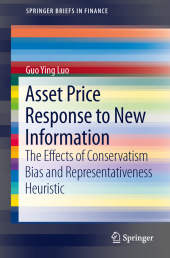 Neuerscheinungen 2013Stand: 2020-01-07 |
Schnellsuche
ISBN/Stichwort/Autor
|
Herderstraße 10
10625 Berlin
Tel.: 030 315 714 16
Fax 030 315 714 14
info@buchspektrum.de |

Guo Ying Luo
Asset Price Response to New Information
The Effects of Conservatism Bias and Representativeness Heuristic
2014. 2013. vii, 70 S. VII, 70 p. 235 mm
Verlag/Jahr: SPRINGER, BERLIN; SPRINGER NEW YORK 2013
ISBN: 1-461-49368-4 (1461493684)
Neue ISBN: 978-1-461-49368-6 (9781461493686)
Preis und Lieferzeit: Bitte klicken
Asset Price Response to New Information examines the effect of two types of psychological biases (namely, conservatism bias and representativeness heuristic) on the asset price reaction to new information. The author constructs various models of a competitive securities market or a security market allowing for strategic interaction among traders to prove rigorously that either conservatism or representativeness is capable of generating both asset price overreaction and underreaction to new information. The results shed some new insights on the phenomena of the asset price overreaction and underreaction to new information. In the literature, very little has been published in this area of behavioral finance. This volume will appeal to graduate-level students and researchers in finance, behavioral finance, and financial engineering.
Chapter 1 Introduction.- Chapter 2 Conservatism bias and asset price overreaction or underreaction to new information in a competitive securities market.- Chapter 3 Conservatism bias and asset price overreaction or underreaction to new information in the presence of strategic interaction.- Chapter 4 Representativeness heuristic and asset price overreaction or underreaction to new information in a competitive securities market.- Chapter 5 Representativeness heuristic and asset price overreaction or underreaction to new information in the presence of strategic interaction.- Chapter 6 The presence of representativeness heuristic and conservatism bias in an asset market.- Chapter 7 Conclusion.- Appendix.- References.
From the book reviews:
"The ideal readers of this book would be PhD students and professors in finance and economics, especially those who have a special interest in behavioral economics/finance. ... this book provides a very nice theoretical contribution on how a simple behavioral bias such as conservatism or representativeness could result in both underreaction and overreaction simultaneously in a stylized two-period setting." (Jianfeng Yu, Journal of Economic Literature, Vol. LII (4), December, 2014)


